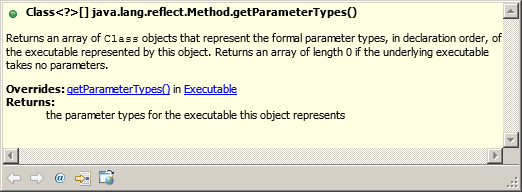为什么说方法签名,这是java 方法重载 (overload) 的唯一依据
https://docs.oracle.com/javase/tutorial/java/javaOO/methods.html
More generally, method declarations have six components, in order:
- Modifiers—such as
public,private, and others you will learn about later. - The return type—the data type of the value returned by the method, or
voidif the method does not return a value. - The method name—the rules for field names apply to method names as well, but the convention is a little different.
- The parameter list in parenthesis—a comma-delimited list of input parameters, preceded by their data types, enclosed by parentheses,
(). If there are no parameters, you must use empty parentheses. - An exception list—to be discussed later.
- The method body, enclosed between braces—the method's code, including the declaration of local variables, goes here.

方法签名由 方法名和参数类型列表组成
method signature—the method's name and the parameter types.
示例1:

这两个方法不能重载,因为方法签名一样
duplicate ['dju:plikət, 'dju:plikeit]
identically copied from an original
示例2

尽管 generic 泛型不同,但泛型只是用来编译时校验用的,方法签名还是一样
依据是什么?
import java.lang.reflect.Method; import java.util.List; public class Test { public void ff(List<Integer> s) { System.out.println(111); } public static void main(String[] args) throws ClassNotFoundException { //the array of Method objects representing the public methods of this class Method[] methods = Test.class.getMethods(); for (Method method : methods) { if(!method.getName().equals("ff")){ continue; } System.out.println("[" + method.getName() + "]"); Class<?>[] parameterTypes = method.getParameterTypes(); for (Class<?> class1 : parameterTypes) { System.out.println(class1); } } } }
输出结果:
[ff] interface java.util.List
下面这个方法没涉及到泛型,返回方法数组

可以这样理解:
方法签名就是 method.getParameterTypes() 和 method.getName()